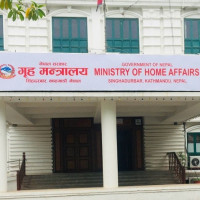- Thursday, 26 February 2026
Unlocking Nepal’s Soft Power Potentials
Nepal, a small but culturally rich nation, provides a distinct perspective on soft power in a global context. Coined by Joseph Nye in 1990, soft power refers to a country’s ability to influence others through attraction and persuasion rather than coercion. Despite ranking 105th in the 2024 Global Soft Power Index, Nepal possesses significant soft power potential through its cultural heritage, geographical significance, and diplomatic relationships.
Nepal’s cultural diversity is a cornerstone of its soft power. With 142 castes and 124 languages, Nepal ranks second in the number of languages spoken after India in South Asia. The Nepali language’s official status in India and Bhutan further underscores its influence. Nepal's syncretic faith, blending Hinduism, Buddhism, and traditional practices, fosters religious harmony. The country is home to 10 religions where 81.19 per cent of people follow Hinduism and 8.21 per cent of people identify as Buddhism.
Spiritual connection
Lumbini, the birthplace of Buddha, plays a crucial role in the dissemination of Buddhist teaching and philosophies. This spiritual connection elevates Nepal’s status in the global religious community and opens avenues for dialogue and partnerships in philosophical and ethical manners. During his October 2023 visit, the UN Secretary-General praised Nepal as ‘a promoter of peace, champion of multilateralism, staunch supporter of sustainable development’ highlighting its diplomatic soft power.
Nepal maintains diplomatic ties with 183 out of the 193 UN member countries which is notable progress. However, possessing these diplomatic connections alone is insufficient. These connections must be strategically leveraged to advance the national interest. To effectively influence the global stage, the budget, capacity, and resources of MoFA need to be significantly expanded.
In 2019, the Government of Nepal announced its intention to seek a Non-Permanent Seat on the UNSC for the 2037-38 term. Since joining the UN in 1955, Nepal has served as a non-permanent member twice in 1969-70 and 1988-89 but was unsuccessful in 2006, receiving the fewest votes. Nepal’s bid for a non-permanent UN Security Council seat for 2037-38 requires stronger engagement with member states, building on its past contributions to the UN.
The Treaty of Peace and Friendship in 1923 with Britain marked a turning point in Nepal’s diplomatic history, enabling it to expand stronger ties. Nepal has been elected and served in various UN bodies. Nepal played an important role in the formulation of SAARC and engaged in various regional organizations such as BIMSTEC, and BBIN. Nepal has been a leading contributor to United Nations Peacekeeping since 1958. Nepalis have been praised for their sincerity and braveness. The reputation as a “land of Gurkhas” strengthens Nepal’s soft power, showcasing its commitment to global peace and security.
The Nepali diaspora, though smaller than India’s and other nations, is growing rapidly. Nepali Diaspora of the USA shows the diaspora power in last year's Cricket T-20 World Cup which took place in the USA and West Indies. As per the US Census Bureau report, the Nepali population was the fastest-growing Asian group, growing from almost 52,000 people in 2010 to almost 2,06,000 people in 2020. As per the Department of Immigration report, 1.674 million Nepalis went abroad in 2024, with 66,835 leaving for permanent residence. This person can form and engage with the Nepali diaspora. Remittance made up 26.31 per cent of Nepal’s GDP. Nepal ranks 19th in the list of top remittance-receiving countries. The diaspora is a major source of income for Nepal.
Diaspora is known as the messenger of the nation and acts as bridge builders. Nepal currently has only 30 embassies abroad. The diaspora can play a vital role in boosting the country's reputation in other nations, thereby contributing to its soft power. By leveraging their skills and resources, they can strengthen economic diplomacy, enhance diplomatic ties with other countries, and promote the development of Nepal.
Nepal’s strategic location between two significant powers India and China offers unique diplomatic opportunities. In his famous book ‘World Order,’ Henry Kissinger praised Nepal’s diplomatic mastery in balancing India and China. Nepal’s strategic positioning between two significant powers India and China enhances its potential for soft power.
Climate diplomacy
Nepal government has recently announced that it will host the “Sagarmatha Sambad” also known as Everest Dialogue, on 16-18, May 2025. This high-level international conference will centre on the theme of “Climate Change, Mountains and the Future of Humanity.” Given that climate change is one of the most pressing issues of our time, engaging in climate diplomacy can significantly enhance our soft power on the global stage.
Despite its potential, Nepal faces challenges such as bureaucratic inefficiency, political instability, and limited resources for diplomatic outreach. With only 30 embassies abroad, the Ministry of Foreign Affairs struggles to project Nepal’s soft power effectively. To elevate its global standing, Nepal must address internal challenges, expand diplomatic efforts, and proactively promote its unique identity and values. By leveraging its cultural heritage, peacekeeping contributions, diaspora, and strategic location. Nepal can unlock its full soft power potential and enhance its presence on the international stage.
(The author is a BALLB student at National Law College.)






-original-thumb.jpg)







-original-thumb.jpg)